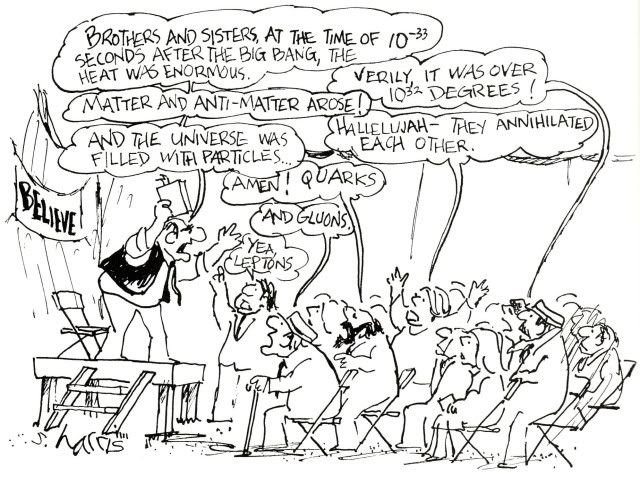Amen! Quarks...
Following on my previous post about science versus faith, I wanted to comment on a point raised in The Simpsons episode, "The Monkey Suit," which is a funny play on the Scopes Monkey Trial. After the trial is over, Lisa explains to Reverend Lovejoy that, while she has respect for his faith, she believes it shouldn't be taught in school. "After all," she says, "you wouldn't want science taught in church."
Actually, as a devoted Christian (and astrophysicist), that's precisely what I want. Not creation science, not science twisted to mean something it's not, but modern science as it is. Why? Gerald Schroeder explains in God According to God.
As an undergraduate physics student, before I became a believer, I had a vague sense that there was more to physics than the study of how things work. There also seemed to be a pressing sense of why. It wasn't until later when a fellow graduate student, and devout Catholic, explained to me his view on the matter that I understood the sense of why: We have both nature and the Bible, and must reconcile the two so that we never become complacent in our assessment of God. In other words, as Schroeder points out, nature is the missing half of God's wisdom, there for us to discover. I find this idea incredibly exciting.
Whether I can convince my fellow Christians of this, I don't know. But I hope that, someday, this cartoon won't be depicting something far from reality.

Actually, as a devoted Christian (and astrophysicist), that's precisely what I want. Not creation science, not science twisted to mean something it's not, but modern science as it is. Why? Gerald Schroeder explains in God According to God.
To understand how that dynamic Force manifests Itself in the ever changing world It created, we turn to the only two sources of relevant information: nature, that is, the world around us, and the Bible. Both provide a confirmation that God's essence is as vibrant as the world itself. In this sense the study of nature is as much a study of God as is the study of the Bible. The eighteenth century theologian known as the Scholar, or Gaon, of Vilna taught that when the Torah was given on Sinai, it split into portions. Only one portion was retained as the written words of the Bible. The other portion was hidden in nature. And only when we finally discover that part of the Torah that was sequestered in nature will we be able to fully understand the word of God.The ancient biblical scholar Maimonides hinted at this almost a millennium ago: If we want to understand the mind of God and his purpose for us, we must study physics and astronomy.
As an undergraduate physics student, before I became a believer, I had a vague sense that there was more to physics than the study of how things work. There also seemed to be a pressing sense of why. It wasn't until later when a fellow graduate student, and devout Catholic, explained to me his view on the matter that I understood the sense of why: We have both nature and the Bible, and must reconcile the two so that we never become complacent in our assessment of God. In other words, as Schroeder points out, nature is the missing half of God's wisdom, there for us to discover. I find this idea incredibly exciting.
Whether I can convince my fellow Christians of this, I don't know. But I hope that, someday, this cartoon won't be depicting something far from reality.




4 Comments:
"Torah was given on Sinai, it split into portions. Only one portion was retained as the written words of the Bible. The other portion was hidden in nature."
How would you fit the Infinite into something so finite as a book?
Answer: you don't. The book points to the Infinite, beyond itself.
And is it God that changes or our understand of God and nature that changes?
How do you fit the Infinite into something as finite as the human mind?
Again, you don't, the mind allows us to point beyond the material and into the Infinite.
"But faith without knowledge -- without the possibility of knowledge -- is just stupid."
-- Gagdad Bob, One Cosmos
For what it's worth, I agree with you. Nature is the Creation of God. We can argue over the divinity of texts, whether they were written by God using man as an instrument, whether they were divinely inspired, but not directly authored, etc...but the Creation of Nature seems to be solidly on the side of "God" as sole author.
Thus, as the faithful, we shouldn't shy away from its study and the truth that it reveals...studying Nature is directly studying the masterful work of God.
And now for the flip side...reason rests upon faith, not necessarily Biblical faith, but faith nonetheless. Follow the rabbit hole deep enough and eventually it rests on an axiom.
The Bible itself recognizes nature as revelatory:
"For what can be known about God is plain to them, because God has shown it to them. For His invisible attributes, namely, His eternal power and divine nature, have been clearly perceived, ever since the creation of the world, in the things that have been made."
- Rom 1:19-20
That being said, we ought to be careful to recognize that although nature is revelatory, for whatever reason, God has made the Bible His primary chosen mode of communication.
Post a Comment
Testing ...
<< Home